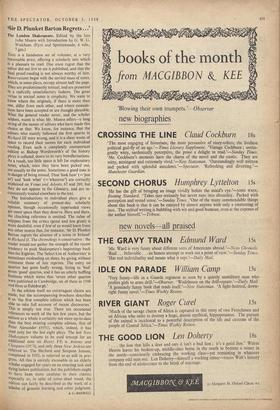'Sir D. Plunket Barton Regrets ...'
The London Shakespeare. Edited by the late John Munro with Introduction by G. W. G. Wickham. (Eyre and Spottiswoode, 6 vols., 7 gns.) Ti-its is a handsome set of volumes, at a very reasonable price, offering a scholarly text which is a pleasure to read. One must regret that the editor did not live to see it published, and that the final proof-reading is not always worthy of him. Reservations begin with the serried mass of notes, which, in some plays, occupy almost half the page. They are predominantly textual, and are presented in a radically unsatisfactory fashion. The great virtue in textual notes is simplicity. We want to know where the originals, if there is more than one, differ from each other, and where emenda- tions have been accepted or are thought plausible. What the general reader never, and the scholar seldom, wants is what Mr. Munro offers—a long string of the names of editors who have made this choice or that. We know, for instance, that the editors who mainly followed the first quarto in Richard III were wrong, and it is a sheer waste of space to record their names for each individual reading. Even such a completely unimportant edition as Bishop VVordsworth's of the history plays is collated, down to its very bowdlerisations. As a result, too little space is left for explanatory notes, which, once they have been picked out, are usually to the point. Sometimes a good note is in danger of being missed. Thus 'look how' (=lust as') and 'look what' (='whatever') are correctly explained on Venus and Adonis, 67 and 269, but they do not appear in the Glossary, and are in- consistently treated elsewhere in the text.
The Introductions to individual plays give a reliable summary of present-day scholarly opinion, though occasionally superseded views get more space than they deserve. Here and there, the clinching reference is omitted. The value of snippets from the critics (great and less great) is more doubtful, even if few of us would learn from any other source that, for instance, 'Sir D. Plunket Barton regrets the absence of a scene in Ireland' in Richard II. The chronology is conservative ; the reader would not gather the strength of the recent tendency to push Shakespeare's beginnings back into the Eighties. The 'Select List of Authorities' is sometimes misleading on dates, by giving without comment those of late reprints. The entry on quartos has gone badly wrong, listing as 'bad' seven 'good' quartos, and it has an utterly baffling footnote which states that 'seven other quartos were published in Cambridge, six of them in 1598 and three at Edinburgh.'
In the edition itself no extravagant claims are made, but the accompanying brochure describes it as 'the first complete edition which has been able to take full account of recent discoveries.' This is simply not true. There are occasional references to work of the last few years, but the edition as a whole is certainly not more up-to-date than the best existing complete edition, that of Peter Alexander (1951), which, indeed, it has used only for the last eight plays. The last New Shakespeare volume to be used (except for an additional note on Henry VI) is Antony and Cleopatra (19f0), and only three New Ardens are referred to. The Herford and Simpson Jonson, completed in 1952, is referred to es still in pro- gress. All this is entirely excusable in an elderly scholar engaged for years on an exacting task and dying before publication, but the publishers ought to have been more cautious in their claims; especially as, in spite of some dead wood, the edition can fairly be described as the work of a scholar of genuine learning and sober judgment.
J. C. MAXWELL


















































 Previous page
Previous page